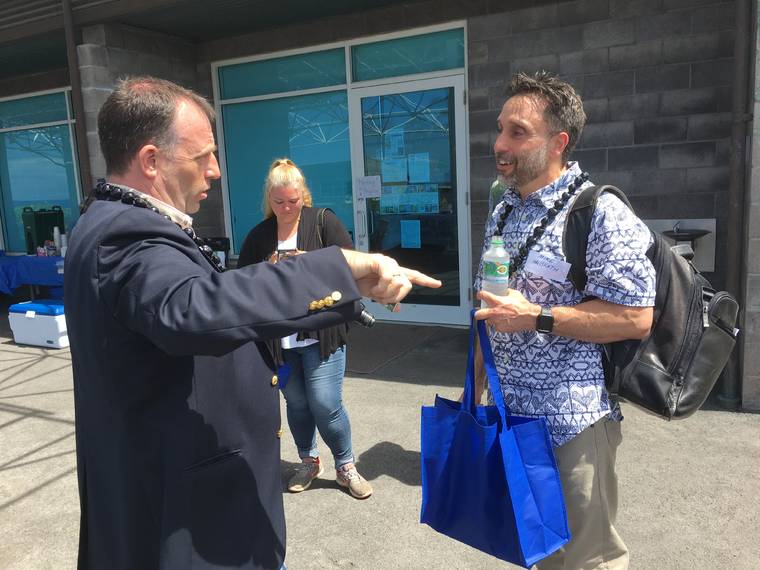Forums focus on supporting residents with substance use disorders, mental health needs
KAILUA-KONA — Seventeen years ago, when the first Hawaii Island Meth Summit was organized to rally the island against methamphetamine, the Big Island Drug Court had just opened.
That same year, 2002, methamphetamine overtook alcohol as the primary substance used by adults admitted to treatment centers in Hawaii.
It wasn’t until 2007, the year of the island’s most recent Meth Summit, that addiction medicine was approved as a board-certified medical specialty.
And on Thursday, the first day of the Hawaii Island Community Forums on Substance Use and Mental Health, health care providers, social service professionals, public policy officials and others rallied together around an issue that all said is going to take a wide collaborative effort.
“You’re in the best field — whether you’re a lawyer, whether you’re in law enforcement, whether you’re in housing or obviously in addiction treatment. This is the crisis of our time,” Lt. Gov. Josh Green told the crowd at the NELHA Gateway Visitor Center. “It’s the economic crisis, it’s the human crisis, and it’s the opportunity for Hawaii to lead.”
Day two of the community forum is scheduled for today in Hilo at Sangha Hall. The event is scheduled to go from 8:30 a.m. to 3 p.m.
While not a summit itself, the event is designed as a follow-up to the summits held in the 2000s.
“And we got a lot of community awareness and reaction, so we’re trying to follow up on something that started a long time ago,” said Going Home Hawaii CEO Les Estrella.“Major issues change in the community, however this has not really gone away.”
The theme of the forum was substance use and mental health as well as how those factor into the issues of homelessness and the criminal justice system.
And Thursday’s forum, Estrella said, is an opportunity to get the wheels turning again.
“We’re glad that we have a lot of great speakers that came, experts in the field, some very knowledgeable people that have been working with this issue for many, many years with very limited resources,” he said, “so now I think getting people back together again, getting the community aware, bringing this back to the forefront so we can get some other additional resources into our community.”
Green said after his remarks that Hawaii has “the absolute potential to lead, 100%.”
The lieutenant governor pointed to the recent passage of legislation that boosts the state’s support of Assisted Community Treatment, which offers support for people with serious mental illness and are homeless.
Green also referenced his team’s statewide tour to determine the needs of the state’s various regions. He and his team were in Kona on Thursday, and he said they’ll be in Molokai today.
“It’s evident quickly what they do need. And we already have most of the pieces in place, but some additions need to be made,” he said.
Outside the forum, local groups and agencies had the opportunity to set up tables and network with attendees to share priorities and strategies for supporting residents with substance use disorders.
Among those tabling were representatives with the Kona Alano Club, who are working toward providing a venue at Kukui Ola, the planned county homeless housing project formerly known as Village 9, for 12-step recovery meetings and a clean, sober environment for people in recovery.
“Up at Village 9, they’re going to have over a hundred people living there that are trying to get back on their feet,” said Karen B. with the Kona Alano Club, who didn’t want to give her last name. “And a lot of those people have some type of addiction.”
That makes the area ideal for the Alano Club, she said, as it will provide Kukui Ola’s residents with a place to find community service or volunteer opportunities as well as resocialize at their own pace.
“And it’s a welcoming place,” Karen said. “Everyone is welcome no matter what your addiction. You’re welcome there. And family and friends of people who are addicted are welcome as well.”
Forum attendee Grayson Hashida, Drug Court coordinator with the Judiciary Drug Court program, said that drug court program and drug courts nationwide are recognizing that many of their clients who have substance use issues also have mental health needs, and that’s something he said they want to be prepared to assess and address.
And the repeated call for collaboration that speakers referenced throughout the forum, he said, is just as big a deal for the Drug Court program.
“That’s a fundamental design of our program,” he said, “So knowing that there are, for example, mental health solutions in our community that are collaborative, it kind of motivates us to get more involved with that collaborative process to see how we can be a part of that, and how we can help them and others in the community and how the community can help us and our clientele.”


